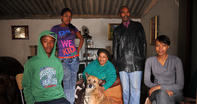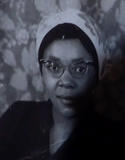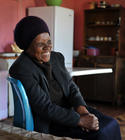Goldie Qayiya

My husband-to-be, Otto, grew up in the same village as me but we did not know each other as children. I first met him when I returned from teacher training college one holiday. I was walking back from the shops and he called out, 'Come here,' to me in a friendly way and asked where I lived. The next time I saw him was at our engagement party.
Otto had written me a letter of proposal. It was important to him that I wanted to marry him too. His letter said that if I consented, he would ask his father to speak to my father. But I was at college when the letter arrived and my parents opened it.
They did not ask my opinion. It was my first year of college. The next time I came back home for a holiday, my father said to me, 'Goldie, you will be getting married.'
The Arranged Marriage

The marriage took place two years later, during the December holidays. Otto paid 10 cows and a horse for lobola within the month we got married. I was very apprehensive. I didn't want to get married at all. We were married in the Anglican Church, then went to Otto's house where everyone was waiting for us outside, cheering.
We spent some time greeting everybody and shaking their hands, then went inside for dinner. After the feast, we all went to the big community hall to dance, at midnight eating the remainder of the feast, which the women had brought to the hall.
Then we danced all night to the jazzy, happy kwela music of Spokes Mashiyane, the African pennywhistle legend of our time, celebrating the start of the lifetime we would share.
Felicia Mfamana

There are two kinds of marriage in Xhosa culture, the proper kind and the abduction kind, and both still happen today. When a man abducts his wife there is no big wedding and no white dress. There's nothing the woman can do about it. I had that kind of marriage. I laugh about it all now. But at the time, it was not funny at all.
My sister-in-law, who lived with my family and whom I had trusted, set it all up. She tricked me into a bus with a stranger. He had a good build and a nice face. There was nothing objectionable about him. Yet I was scared. 'What's going on? Where are you taking me?' I asked. His pleasant, coffee-coloured face became solemn.
'I am taking you home to be my wife,' he said. 'I have wanted this for a long time and now, at long last, it is happening.' 'But I don't want to go with you,' I said. 'Please, stop the bus and let me get off.' In my rising panic, I began to cry. I could not bear to leave my father this way. He was a church-going man. 'Try to understand,' my husband-to-be said. 'I really want you to be my wife and I'm not waiting any longer. Remember, in our culture I am allowed to do this.'
Felicia’s New Family
The bus took us to his family homestead where there were four houses on the property. One was the home of his sister Noyiswa, where I was to stay for the first week. That night I cried and cried. I realised with a sickening sense of loss that this was the end of my girlhood. After the first week, he sent two men to my father and brothers to tell them where I was.
'You've taken my daughter without permission,' my father said, very cross. 'You'll have to give us an extra cow. Ten cows for lobola and one for not asking permission.' The ceremony took place in Milton's parents' house. Everybody from his family was there. My father could not come. It was too far. An elder from the community came to marry us.
'You are a new wife now and your new name is Nothozamile,' he told me. 'You have a new family, with a new father and mother and new sisters, and you must accept that. You are no longer a girl. You must behave like a woman now.' At the end of the ceremony he said, 'You are now indoda nomfazi, man and wife.' A sheep was slaughtered for the celebration, and the women of the family made salad, rice and stamped mielies to go with the meat. After that, we were properly married. My life as a wife began.
By Jo-Anne Smetherham